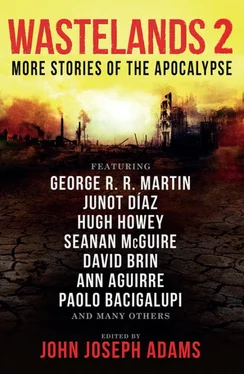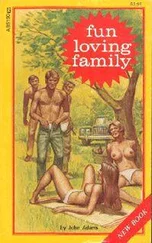She remembered how her own grandparents had spoken exclusively about the past in their old age. She’d still been studying for her math degree, and she hadn’t had any time for those stories. Marie told the ad about other things, about how to know when it was time to pick a pear, about the earth-poison smell of tomato vines and the acid-sharp taste of the fruit.
She was trying to explain the particular crumbling feel of good soil and the moist smell of fresh potato when Ad-Robert interrupted.
It was the only time the ad interrupted her. At all other times, it had been perfectly behaved.
“Have you ever considered your death?” it asked.
Robert had once asked her that. They’d been young, and it had been more a joke than anything else. Marie couldn’t look at Ad-Robert when she answered, so she stared out the window at orange-tinged clouds that hung over the forested mountains around her home.
“Yes,” she said.
* * *
She had been planning to go grocery shopping the day the world ended, after she’d weeded the gardens and picked some zucchini. But she’d turned on the news that morning to pick up the one local channel available from her satellite dish.
Biological agents. Super bug. Nobody on the channel or in any of the borrowed clips they showed could determine if they thought it was terrorism, or just freak random chance. It was a virus, then it was a bacterial infection that antibiotics couldn’t touch. Masked and suited reporters questioned the sobbing, quarantined mothers of sick children. Scientists or doctors postulated that if the illness killed its victims so soon after infection, then it couldn’t spread much farther.
The rebuttal was simple: there was no way to know how long it gestated, and how long it was contagious. The rebuttal sparked more panic, because the man giving it finished by pointing out that the entire human race could already be infected and not know it.
Marie had turned off the television and sat on her porch in the late summer sunlight for a few hours, and when she’d turned it back on, she hadn’t gotten any reception.
A day later, the electricity had been cut off.
* * *
One morning when she walked into the kitchen for her medication, the ad did not greet her as it had for the past month. Instead it sat, silent and dark, a life-sized doll made out of LCD and carbon. It no longer appeared to be anything like Robert. It was just a lifeless machine that had grown tired of masquerading as her husband.
She stared at it for a long time, expecting it to come to life with another skewed economics lecture. In case it had a sleep function, she prodded it with a wooden spoon, poking it resolutely in the stomach, the arm, the face. Nothing.
Marie sat down on the other side of the table, leaned far over it and stared at the ad. The face was not really human, but she traced the features with her fingertips, over the smooth hills and valleys that gave the ad a physical presence when it was on. The screen itself was cold to the touch, and she left little skin-oil smudges behind.
Down the neck and across the chest, she could see scratches and scrapes from tree branches and possibly animals. Places where she might have noticed pixels out if she’d looked at it more closely.
Marie sat back in her chair. When she had finished crying, she was left with the problem of disposing of the body. She felt foolish, too… Hadn’t she meant originally to kill the stupid things?
The ad was lighter than she’d thought it would be. For all it was nearly the size and build of Robert, it was made of far lighter materials than flesh and bone. Marie was able to drag it with one hand under its left shoulder. She carried her lightweight shovel with her other hand, prodding or swatting any of the outdoor ads that got in her way.
They were still as obnoxious as ever, hovering, surrounding, circling Marie and the dead advertisement like sharks around a sinking boat. The air filled with pitches, slogans, prices.
“We don’t have to pay until 2045!”
“I really think you’d like these perfumes, honey.”
“Come and visit, the alcohol’s free!”
Marie trudged along the thin dirt path that led from her little house, until dry pine needles crackled under her clogs and under the feet of the ads that followed her in a herd. When the ground went flat for a bit, she dragged the ad through a few feet of sparse sword fern.
She dug a shallow grave under a tamarack, and covered the ad with just enough dirt to hide it from view. She didn’t think anything would dig it up, but she felt a little bad for not making the grave deeper when the other ads walked over the mound of dirt mixed with pine needles.
Marie wiped her face on the sleeve of her rosebud blouse, and then she took her sweet time walking back down the mountain, still ignoring the advertisements that seemed entirely unaware of the loss of one of their number.
* * *
Marie found the second dead advertisement a few days later, toppled over on the front walkway to her house, scuffed from the feet of the other ads, as motionless and empty as the one that had died in her kitchen.
She thought very seriously about burying it with the other ad, but then she looked at the crowds of them that filled her yard and thought better of it. So Marie dragged the second advertisement out to her shed, and she propped it up between a rake and a hoe, leaving it for the dust to collect on. She realized she could have left it out among the other ads, but she didn’t like the idea of her home being surrounded by forgotten bodies.
Every few days she found another, sometimes only toppled over as though its batteries had simply quit, and sometimes sitting tucked against the side of her house as though it had powered down.
She filled her shed with them, and started setting the others up as scarecrows, guarding her vegetables from the birds, though they did nothing to keep away the smaller animals and deer when they didn’t move.
* * *
The month lengthens and becomes two months, then three, four, five. The ads still come, but there are fewer, and as time goes on, Marie finds that sometimes weeks pass between appearances. Now, when the ads arrive, they are very little danger to her gardens, and she is able to harvest what she needs without them getting in her way.
They come to her to die and sometimes, when it has been a long time between visits, she lets the ads inside, and she listens to them while she serves sandwiches and tea she has made from what she can grow on the plot of land behind her house. The ads that make it to her mountain are moving slower and slower, and Marie is not surprised. She is moving slower these days, too, though she is not sure if that is the weather, leaning in toward winter, working cold into the ragged edges of her joints, or what is left to her now the pills have run out.
Every so often, the ads look like Robert. Sometimes they look like her friends; sometimes they look like her mother. Sometimes they look like nobody she has ever known, and sometimes they look like she imagines her children would have if she and Robert had ever cared to try.
Maybe when the winter is done, she thinks, she will climb down from her mountain to see what is left. The smell of the dead in the city will have gone by then, and there may be other survivors on other hills, looking for her. She holds the slightest of hopes that there are fewer ads because they have found others, and not just because they were never meant to last for so long, lost and alone in a dead world.
HOW THE WORLD BECAME QUIET:
A POST-HUMAN CREATION MYTH
RACHEL SWIRSKY
Part One—The Apocalypse of Trees
Читать дальше












